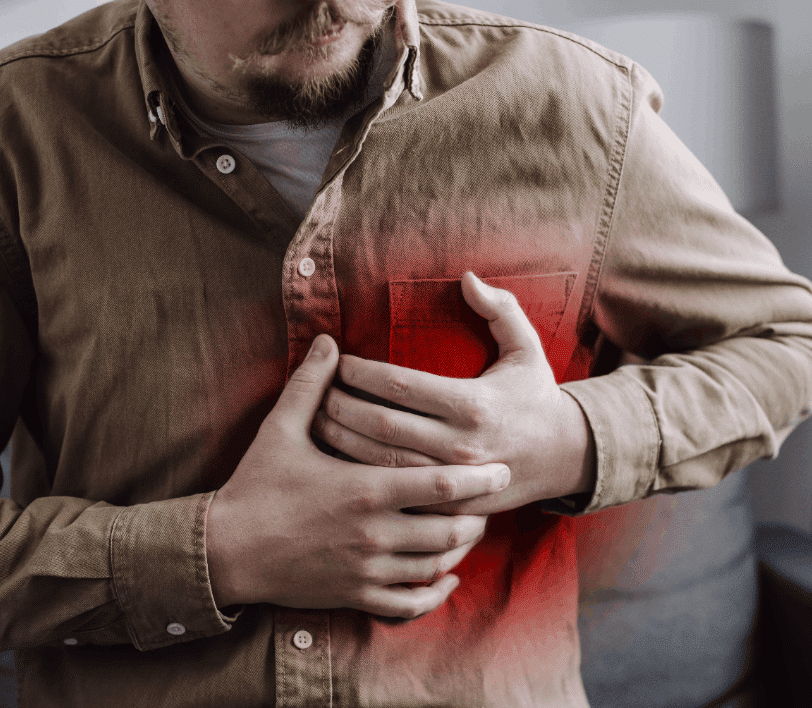Atrial flutter
Lorem ipsum dolor sit amet, consectetur adipiscing elit.

Some people have heart rhythm problems or “arrhythmias”that can cause heart flutters, which are also called palpitations. One type or arrhythmia is called atrial flutter. Imagine your heart as a drum, beating in a steady rhythm. When you have atrial flutter, it is like the drummer in the upper chambers of your heart starts playing a much faster but still steady beat.
You might be wondering what this feels like. Some people say it feels like their chest is fluttering or pounding. You could also feel worried, faint, or tired for no reason. Keep in mind that not everyone has symptoms, which is why it is so important to get regular check-ups.
Atrial flutter can be paroxysmal, which means it comes and goes, or persistent, lasting longer. Other heart conditions, high blood pressure, or even diabetes or thyroid disease can raise your risk.
Visit your CVG cardiologist if you suspect you’re experiencing heart flutters. Our doctors have the expertise to distinguish atrial flutter from similar conditions, like atrial fibrillation. Your doctor can use various tests, such as an electrocardiogram (EKG) or a Holter monitor, to accurately diagnose your condition.
Treatment options vary depending on your situation. Your doctor might prescribe medications to slow your heart rate or control its rhythm. In some cases, procedures like electrical cardioversion or catheter ablation might be recommended.
Your heart works tirelessly for you every day. You’re taking an important proactive step by visiting our CVGheart doctors to test for heart flutters. It’s not just about addressing current symptoms but protecting your long-term heart health and ensuring you can live fully.
Learn more about heart flutters on this page and how CVG provides comprehensive cardiac care.
What Heart Flutters Can Mean
Atrialflutteris aspecific type of heart palpitations, which is a heart rhythm disorder that results from an abnormal circuit inside the upper chamber of your heart, known as the right atrium. This causes an irregular heartbeat; a normal heart rate is about 60 to 100 beats per minute, while an abnormal heart rhythm caused by atrial flutter is about 250 to 400 beats per minute in the upper chambers and can be conducted at variable rates to the lower chambers usually 60 to 300 beats per minute.
Types Of Atrial Flutter
There are two types of heart flutters which differentiate between whether it is chronic or acute. Paroxysmal atrial flutter means that the condition comes and goes, with an episode typically lasting between hours and days. On the other hand, persistent atrial flutter is a chronic heart condition that is more or less permanent.
Atrial flutter can commonly be confused with atrial fibrillation (AFib), although these are two distinct conditions. However, they are closely related as they are both types of arrhythmias. About one-third of people with AFib also experience atrialflutter.
During atrial flutter, the electrical impulses in the heart do not travel in a straight line from top to bottom. Instead, they move in a circle inside the upper chambers. This means that even though the heart is beating too fast, it still has a steady rhythm.
In atrial fibrillation, the electrical signals travel in a pattern that is both fast and disorderly, which causes the atria to quiver instead of squeezing strongly. This causes the heart to beat too quickly, just as with atrial flutter, yet the difference is this heartbeat does not follow a steady rhythm.
Risk Factors For Atrial Flutter
You have an increased risk of experiencing atrial flutter if you have been diagnosed with heart problems such as heart failure, high blood pressure, or heart valve problems. Other conditions that can heighten your risk include COPD, diabetes, thyroid disease, alcoholism, or other serious illnesses. Your risk can also increase if you have previously suffered from a heart attack.
Causes Of Atrial Flutter
In some cases, there is no identifiable cause for atrialflutter, but typically it is due to heart disease or diseases elsewhere in the body that can affect the heart. Some of the heart diseases that may lead to atrial flutter include hypertension, ischemia, cardiomyopathy, abnormal heart valves, and hypertrophy. It may also be caused due to recovery from open heart surgery.
Diseases elsewhere in the body that may affect your heart can include hyperthyroidism, pulmonary embolism, or chronic obstructive pulmonary disease (COPD). Besides these diseases, heart flutters can also be linked to substance use, such as alcohol consumption or use of stimulants such as cocaine, amphetamines, diet pills, cold medicine, and even caffeine.
Unstable Angina
Unstable angina is either new angina within the last 60 days, or stable angina that begins to occur at lesser levels of exertion or even occurs without any physical activity, at rest. The implication is that the blockage that is provoking the angina is worsening. It usually has a worse prognosis.
Diagnosing Atrial Flutter
If you believe you have atrial flutter, make an appointment with your doctor. The first thing your doctor will do is discuss your symptoms with you to determine if other diseases may be causing the flutters. If your doctor suspects another condition, there are a variety of tests that can be conducted. These tests will also help discover what type of arrhythmia you are experiencing.
Your doctor may order an electrocardiogram (EKG), echocardiogram, or blood tests. If your symptoms are not persistent, your doctor may ask you to wear a holter monitor or event recorder for a few days, as these record your heart and will track your symptoms whenever the arrhythmias occur. Once the type of arrhythmia and the condition causing the atrial flutter have been discovered, your doctor will decide your treatment plan based on these factors.

Treatment For Atrial Flutter
You may be prescribed heart rate medications to slow your rapid heartbeat and help the heart muscle pump blood more effectively. These medications can include digoxin, beta blockers, and calcium channel blockers. Heart rhythm medications may also be used for treatment, such as sodium channel blockers to slow your heart’s ability to conduct electricity, potassium channel blockers to slow the electrical signals, or anticoagulants to prevent blood clots.
Other than medications, your doctor can also perform procedures such as electrical cardio version or a specific form of catheter ablation known as radio frequency ablation.
Symptoms Of Atrial Flutter
Since atrialflutteris a subgroup of heart palpitations, many of the symptoms you may experience are similar, although some people do not experience any symptoms at all. People with atrial flutter may describe feeling a fluttering or pounding sensation in the chest, anxiety, shortness of breath, trouble exercising, confusion, or fatigue. If the atrial flutter is caused by other heart or lung diseases, the symptoms linked to the condition may be more severe. These symptoms include chest or heart pain, lightheadedness, and fainting.
Why Choose CVG?
At CVG, our cardiologists offer extensive experience caring for patients using state-of-the-art techniques. Their compassion adds so much to your care because our doctors understand how heart issues can affect you physically and take an emotional toll. Trust is the #1 factor in the doctor/patient relationship. You can trust your CVG cardiologist with every aspect of heart care
Related Conditions:
Top Conditions:
Call to Schedule an Appointment
Board-certified Doctors
CVG’s twenty board-certified heart doctors will guide you through your healthcare journey with the utmost compassion and individual attention. Our goal is to provide you with state-of-the-art cardiac care that includes the full spectrum of services, from testing to diagnosis and treatment. The doctor/patient relationship is built on trust. Through our combined efforts, we can conquer any challenge that comes our way.
How CVG Can Help
CVG offers a variety of services that can check and treat symptoms
CVG offers various services that can. At CVG, we perform stress tests that will observe blood flow and test for Atrial Fibrillation. We perform three types of stress tests:
There are several tests to determine the extent and severity of coronary artery blockages.
A treadmill test is one in which you will walk on a treadmill that gets faster and steeper every 3 minutes. This will stress your heart under professional supervision and the ECG will be continuously recorded and evaluated.
For increased ability to detect blockages an echo (ultrasound) or a nuclear isotope may be combined with the treadmill test to evaluate the blood flow in the heart. performed before and after your treadmill test to determine how well your heart pumps blood.
We also offer cardiac catheterization, in which a catheter (small hollow tube, smaller than the inkwell in a pen)is inserted into the wrist to directly visualize the heart arteries. This procedure allows doctors to gain more information about your condition and suggest treatment options.
If these tests determine a problem, we offer treatment solutions for several conditions. Learn more about our services here, or schedule an appointment to talk to our doctors.
Schedule Your Appointment with a CVG Atlanta Area Cardiologist
Atlanta Area Cardiologist
Expertise, experience, and compassion are the pillars of CVG’s patient-centered cardiac care. Please schedule your appointment with CVG today. Call (770) 962-0399 or 678-582-8586. You may also request an appointment online. If you have an emergency, don’t contact us online; please call 911.
Loactions That Treat Arrhythmias

Office Suwanee
1120 Peachtree Industrial Boulevard Suite 208 & 209 Suwanee, Georgia
- 7706379247
- 7702908084





